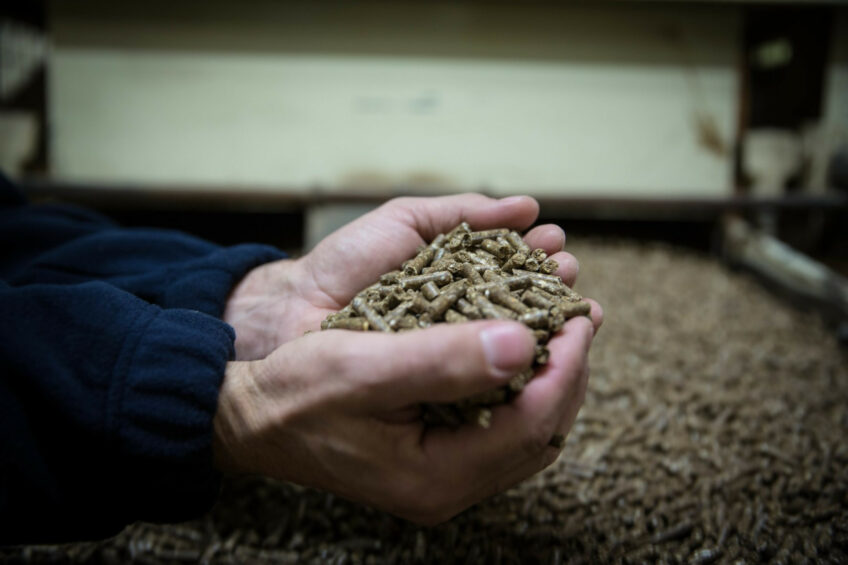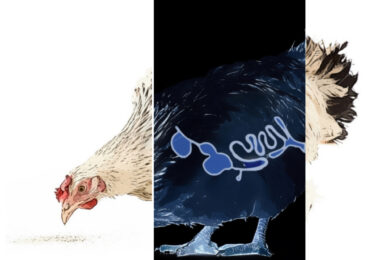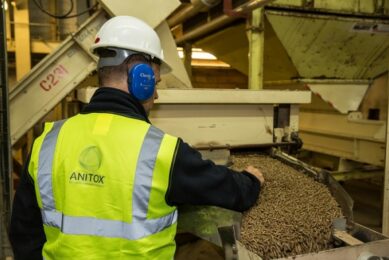Feed pathogen control using organic acids and intervention programmes

Feed is a fomite for bacterial and viral contaminants like Salmonella, posing significant risks to both animal and human health. Pathogen control in feed production is therefore a critical aspect of biosecurity for livestock systems.
Traditional approaches to chemical feed pathogen control, while essential, often fall short in providing long-term feed safety, yet add significant cost. Ongoing research has demonstrated that integrating targeted interventions with organic acid and aldehyde-based feed sanitisers, solutions with a high level of long-lasting efficacy at low inclusion, help feed producers achieve more efficient and sustained pathogen management, reducing the risk of contamination and recontamination, while optimising cost and efficacy.
Feed safety challenges in livestock production
Feed is a significant vector for microbial transmission, with pathogens like Salmonella and E. coli contaminating feed ingredients from the field through transportation and processing. Contaminated feed not only threatens animal health but also carries the potential to introduce pathogens into the human food supply chain.
Studies have demonstrated the prevalence of Salmonella in feed ingredients. For example, Kukier et al. (2013) reported on pathogen recovery in oilseed meals and animal-derived proteins, while Morita et al. (2007) reported on the extent of Salmonella in soybean and rapeseed meal imports. Recent research by Munoz et al. (2021) identified Clostridium spp. and E. coli in both raw ingredients and finished feed, with recontamination occurring post-pelleting in some feed mills, underscoring the persistence of pathogens despite processing interventions.
Given the complexity of feed safety, particularly when microbial loads fluctuate due to variations in crop conditions, geography, and seasonality, and post-harvest processing, a comprehensive approach is required to address contamination and recontamination risks effectively.
Limitations of traditional organic acid treatments
Organic acids such as formic, propionic and acetic acids are commonly used for pathogen control in feed. However, even at high inclusion rates, organic acids are often unable to achieve the required level of pathogen reduction, particularly against Salmonella and viral contaminants. The bacteriostatic nature of organic acids means that they inhibit microbial growth but may not fully eradicate pathogens and, critically, fail to prevent recontamination after treatment, leaving feed vulnerable during storage and transportation.
Additionally, treating the entire volume of feed by applying organic acids into the mixer, which is often the case for breeder and parent stock feeds, can be costly, especially given their limited efficacy in addressing certain high-risk pathogens. As feed moves through the feed manufacturing process, from raw materials to finished feed, it can introduce pathogens or is exposed to multiple contamination points during the process. To address these challenges, an advanced, multi-point approach that focuses on specific stages in the feed manufacturing process – where pathogen risk is highest – offers a more effective and sustainable solution.
Multi-Point Intervention Programmes (M-PIPs): a targeted approach
Multi-Point Intervention Programmes (M-PIPs) are a scientific, risk-based strategy designed to enhance pathogen control at critical stages of feed production.
1. Pre-treatment of high-risk raw materials
High-risk raw materials, such as processed vegetable, animal and cereal meals, often carry high microbial loads. By pre-treating the higher-risk ingredients before they enter the feed mill, M-PIPs significantly reduce the introduction of pathogens into the manufacturing process. This early intervention helps minimise contamination in the feed mill.
2. Elimination of legacy bacteria in feed mills
Pathogens can establish colonies within feed mills, thriving in cool areas and contaminating subsequent batches of feed. M-PIPs target these legacy bacteria by moving treated feed materials through feed production contact surfaces, breaking the cycle of bacterial colonisation and preventing recontamination of feed.
3. Protection of finished feed against recontamination
Post-production handling and storage of feed introduce the risk of recontamination. M-PIPs provide a final layer of protection by applying feed sanitisers that prevent pathogens from re-entering the feed after it leaves the mill. This ensures that feed remains safe until the point of consumption.
The role of Anitox in M-PIPs: Finio and Fortrol
Anitox has evaluated the roles of the organic acid blend, Fortrol, and the feed sanitizer, Finio, within an M-PIP and observed that the strategic use of each leads to cost-effective control of feed-source pathogens. These formulations target pathogen control at critical stages of the production process.
Finio provides long-lasting protection against pathogens such as Salmonella, Clostridium, and E. coli. It is effective at low inclusion rates, reducing the microbial load in finished feed while, critically, protecting it from recontamination for up to 14 days. Fortrol is a synergistic blend of organic acids that reduces pathogen loads in feed and feed ingredients.
M-PIP models in preliminary laboratory evaluations have shown that applying a feed sanitiser to high-risk raw materials at intake significantly reduced the amount of Salmonella detected in finished feeds, however, an even greater impact was noted when Fortrol was subsequently applied to finished rations. These findings evidence that strategically using the right tools allows for more targeted control that reduces overall treatment costs while enhancing feed safety. In the long term, M-PIPs help minimise the risk of feed mill contamination, pathogen-related losses, improve feed quality and enhance livestock productivity.
The combination of organic acids and more effective feed sanitisers in M-PIPs represents a significant advancement in feed pathogen control, offering a comprehensive, cost-effective solution that addresses the limitations of traditional practices. By targeting high-risk points in the production process and utilising innovative formulations such as Finio and Fortrol, feed producers can achieve enhanced pathogen control, reduce feed mill recontamination risks, and ensure long-term feed safety.
To learn more, please visit www.anitox.com.




